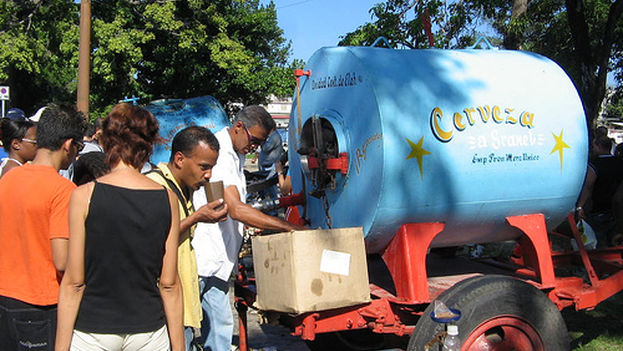
![]() 14ymedio, Caridad Cruz, Cienfuegos, 17 December 2016 – The rumor was confirmed Thursday by the local newspaper 5 de Septiembre, the official organ of the Communist Party in Cienfuegos province: all parties are suspended until January as part of the ‘hangover’ of the obligatory mourning for the death of former president Fidel Castro.
14ymedio, Caridad Cruz, Cienfuegos, 17 December 2016 – The rumor was confirmed Thursday by the local newspaper 5 de Septiembre, the official organ of the Communist Party in Cienfuegos province: all parties are suspended until January as part of the ‘hangover’ of the obligatory mourning for the death of former president Fidel Castro.
“The people themselves, in the majority, prefer solemnity and intimacy in these celebrations,” says the weekly, which is once again available online after a lengthy period of inactivity.
The news does not come as a surprise to anyone. During the official mourning for the death of the former leader, the police made clear that no one could express the slightest sign of joy. A young Cienfuegan was beaten and arrested near La Calzada service station, and there are several reports of arrests and threats in the city in the south of the island.
“A week after the death of Fidel, the bosses explained to us that there could be no loud music in the bar,” explained a beer seller who didn’t want to be identified for fear of reprisals.
The man affirmed that it was even said that alcoholic beverages would not be sold for the rest of the year, but in the end “those up above” changed the decision.
“I’m sure that for Christmas there will be a shortage of beer and then the government will say they didn’t prohibit it, but there simply isn’t any available. That’s nice, you have to understand,” he added.
Using a term typical for the Cuban bureaucracy, 5 de Septiembre makes it clear that activities in open spaces, such as trochas, carnivals or keggers “will not proceed.”
The justification given by the newspaper is that “the particular idiosyncrasy of we Cubans establishes that crying and sadness do not end overnight.”
“In the end it’s all the same to me, I do not go to those carnivals because the products are expensive and low quality, there are tremendous crowds of people and you’re just looking for trouble,” says Liudmila, a housewife of 41.
“How many people have they killed at those parties when they get drunk? They should end them all. Besides, what products are they talking about, if all you find at the stands is an infinite variety of egg dishes and the same things as always that nobody buys,” she adds.
Yurizán, a 24-year-old barber, believes it is “an abuse.” “Why do they have to decide for me if I want to be sad or not? It’s always the same in this country, they think and the rest have to obey, that’s why people finally go somewhere else,” he says, annoyed.
Although the newspaper specifies that the province is not in mourning, it makes clear that all celebrations will be moved to January, but citizens will have the opportunity to celebrate historical anniversaries such as “the advent of the 58th anniversary of the Revolution,” the landing of the yacht Granma and one more edition of the Freedom Caravan*.
In addition, the paper explains that “the sale of alcoholic beverages in stores and establishments is not restricted and will take place daily.” The newspaper says that the Ministry of Internal Commerce is managing the importation of beverages to keep them on the market.
“Even though they ban parties, no one can take my end of the year blow out away from me, even if I have to have it in my back yard,” says the young man.
*Translator’s note: The 9-day cross-Cuba journey of Fidel Castro and the guerillas after the triumph of the Revolution, from Santiago to Havana, was dubbed the “Freedom Caravan” and continues to be celebrated annually. Recently, the reverse journey of Fidel’s ashes was also called by the same name.
